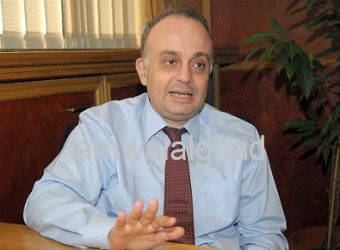Egypt’s financial regulator plans measures by early next year that would allow the launch of exchange-traded funds, spur bond trading and cut red tape to stimulate growth in an economy hammered by nearly three years of political turmoil.
Sherif Samy, the new chairman of the Egyptian Financial Supervisory Authority (EFSA), said smoothing the operations of the capital markets were one way to restore investor confidence.
“The biggest problem for those dealing with the authority is the lack of adequate speed in completing transactions, and this is a challenge for us,” he said in an interview at the Reuters Middle East Investment Summit.
“We are working on it as well as simplifying measures such as listing regulations.”
Much activity in Egypt’s capital markets froze up during the political instability which followed the ouster of President Hosni Mubarak in February 2011. Egypt’s last initial public offer of shares was in November 2010.
The weakness of the stock market deprived companies of a source of funds, pressured balance sheets and hurt business confidence. The market has recovered only partially since Islamist President Mohamed Morsi was overthrown in July this year; the main index .EGX30 is up 38 percent from this year’s low, but still 15 percent below its 2011 peak.
Many foreign portfolio managers have pulled money out of the Egyptian market, which suffered another blow this year when the Dutch-listed parent of Orascom Construction Industries (OCIC.CA), the Cairo market’s biggest blue chip, bought out almost all outstanding shares in OCI. This effectively cut the market’s capitalization, making it even less attractive to foreigners.
So encouraging other Egyptian companies to list their shares and boost the stock market’s capitalization will be an important part of drawing foreign portfolio investors back to the country.
The EFSA may cancel the requirement for a listed firm to seek the regulator’s permission to split its shares or call a general assembly prior to a capital increase, as long as it complies with pre-set rules, said Samy, who was appointed in August.
“Listing regulations are in dire need of additions, omissions and amendments. We have communicated with active market participants and received suggestions from the bourse,” he said. “We have a draft that I want to present to the (EFSA) board.”
He added that he expected the regulations to be revised before the end of this year.
ETFS
The EFSA is also drafting rules that would pave the way for the launch of the country’s first exchange-traded funds (ETFs), which are listed investment funds. It hopes these will be approved this year.
“There was a workshop that included the authority and the bourse…I believe they have reached a final draft for it that must be presented to the board of directors,” Samy said.
“We have two firms that have expressed interest in issuing exchange-traded funds… I believe with the success of the first we will see more of them.”
The first to express interest was Beltone Financial (BTFH.CA). The Cairo-based investment bank plans to launch a fund mirroring the performance of the EGX 30 stock index, Beltone said on its website.
By early next year, the EFSA hopes to complete a project that has been 10 years in the making: the introduction of rules for bond trading that would make it easier for investors to buy and sell securities on the bourse.
“Today we are a limping market that depends only on stock trading…We have been talking about this issue for 10 years but sooner or later it has to click, and I hope it clicks…It is feasible,” Samy said.
A small number of bonds already trade on the Egyptian stock exchange, but activity is light because once banks and investors buy government securities, they tend to hold onto them until maturity. A few corporate bonds trade as well.
Samy said the new rules would not interfere with the existing interbank market for bonds, where activity can be heavy, but banks would need to offer some of the bonds they bought to be traded on the bourse.
“There must be an acceptance or a moral obligation from banks to be the creator of the market by offering a minimum number of issues,” he said.
The EFSA is also considering allowing shorter-term bonds with 12- or 13-month maturities as well as multiple-issue bonds, a measure that Samy thinks could be in place in December.
The government several weeks ago began issuing an 18-month bond alongside its traditional maturities of three, five, seven and 10 years – a step towards building a yield curve in Egyptian debt, which would help to encourage bond trading.
The EFSA also plans to issue Egypt’s first rules for microfinance, the provision of extremely small loans which could help to create jobs by giving individual entrepreneurs a start.
It hopes to have the rules approved as a special law that does not need the approval of parliament, which will not be operating until elections that are expected next year. The last, Islamist-dominated parliament was dissolved by the military-backed interim president after Morsi’s overthrow.
“We are working on it and have a draft,” Samy said.
Source: Reuters


